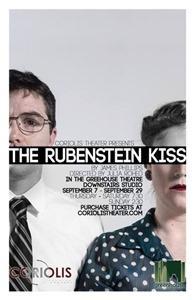
The Rubenstein Kiss
Written by James Phillips
Directed by Julia Rohed
Greenhouse Theater, 2257 N. Lincoln (map)
thru Sept 29 | tickets: $20 | more info
Check for half-price tickets
Read entire review
Poignant drama brings Rosenberg-inspired story to the stage
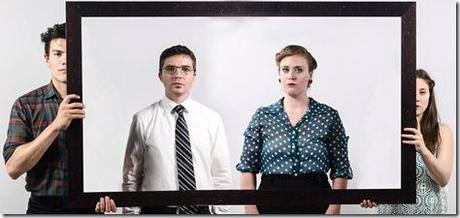
Coriolis Theater Company presents
Rubenstein’s Kiss
Review by Patrick Dyer
Historical dramas are a tricky field. You have to focus on an event or persons with strong historical context in a compelling dramatic form without it overshadowing character, conflict and motivation. In The Rubenstein Kiss, playwright James Phillip offers a fictionalized account of the infamous execution of Julius and Ethel Rosenberg. Of course, this is even trickier with trying to create new characters and situations while keeping the historical part intact, but Coriolis Theater Company’s latest production brings out the poignancy of the story and overcomes the flaws in the script.
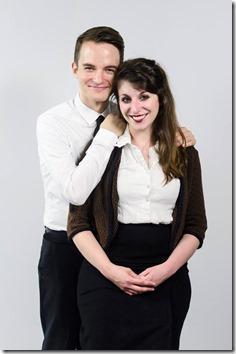
The Rubenstein Kiss is an ambitious drama, spanning three decades, trying to tell the story of the Rosenberg trial through a different point of view. Does it succeed? In general, yes. But there are some bumps along the way in Phillip’s script. Act I is a bit muddled, especially when trying to connect Matthew and Anna’s storyline with the Rubenstein’s. There are also some confrontational scenes when the characters shift viewpoints a bit too sporadically. But for every stumble, there’s always a highpoint. For example, David was involved with the atomic bombings of Hiroshima and Nagasaki and fears that the radiation from the blasts may have caused the death of his first-born child. And of course, there’s the relationship between Jakob and Esther, which is relatively strong, most notably in Act II. Phillip keeps the play grounded in a purely humanistic perspective, and director Julia Rohed maintains this with her fluid and sympathetic direction. Her use of the space and especially Ryan Emens’ set design is very creative: white rectangles with old photographs that represent the history museum at the beginning of the play are stripped away during every scene transition as the Rubenstein home is revealed. Rohed plays around with the symbolism of the piece without it overshadowing the characters and their interactions.
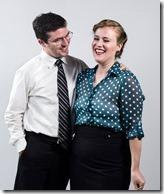 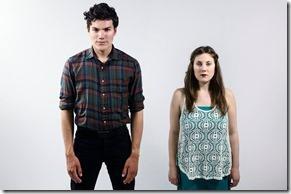
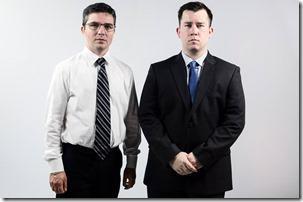  |
The play wisely makes the right choice in not trying to get the audience to side with the real-life Rosenbergs by having Jakob and Esther questioning their own motivation and whether or not they’re right in leaving their new-born son an orphan. Despite having a strong political context, The Rubenstein Kiss is about the people and their relationship with each other. The political aspects are only catalysts and backdrops, allowing the audience to come to their own conclusions. And even then, the play is still a fascinating history lesson for those unfamiliar with the Rosenbergs. Phillip also brings out the Jewish aspect of the Rubensteins in a respectful manner. There’s one haunting line spoken by Jakob as he talks about the Jews in the concentration camps, calling them “the people known only by the wind and smoke.”
The cast as a whole is relatively strong, bringing out the sympathy needed to make this fictionalized account work. Fleming and Ohanian are appropriately passionate and loving towards one another, making their inevitable ending all the more touching. Chapman is more subdued in her portrayal and is at her best after her character Rachel loses her firstborn child (even if at times she struggles to project). Manucchio has a little trouble making his outburst believable and speeds through his lines, but his strongest moment is when he reveals his fear of possibly affecting his wife’s pregnancy. Silverberg brings out the sympathy and pain of Anna – especially in Act II – and has good chemistry with Baker. Baker can be a bit one-note with his delivery, but when he needs to be passionate, he gets the job done. Hutson makes the most out of Mr. Crammer, especially in Act II when he confronts Matthew and shares his personal feelings about the Rubensteins.
The Rubenstein Kiss is a poignant drama and even a good history lesson. Rohed and her team overcome the bumps in the script to deliver a humanistic and touching insight into one of the most debated executions of the twentieth century. This was a story that wanted to be told, and Coriolis Theater Company tells it with sympathy and heart.
Rating: ★★★
The Rubenstein Kiss continues through September 29th at Greenhouse Theater, 2257 N. Lincoln (map), with performances Thursdays-Saturdays at 7:30pm, Sundays 2:30pm. Tickets are $20, and are available by phone (773-404-7336) or online through GreenhouseTheater.com (check for half-price tickets at Goldstar.com). More information at CoriolisTheater.org. (Running time: 2 hours 15 minutes, includes an intermission)

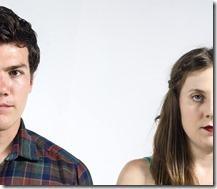
Photos by Liz Scheiner Photography
artists
cast
Rayme Silverberg (Anna), Elliot Baker (Matthew), Matt Fleming (Jakob), Theresa Ohanian (Esther), Michael Manocchio (David), Stephanie Chapman (Rachel), Jesse Hutson (Mr. Crammer), Johnny Graff (u/s Matthew/David), Rachel Shapiro (u/s Rachel, Anna), Victoria Montalbano (u/s Esther)
behind the scenes
Julia Rohed (director), Julia Gray (stage manager), Jerico Bleu (dramaturg), Lindsay Bartlett (dialect coach), Max Horowitz (lighting), Kate Grudichak (costumes), Alex St. John (sound), Ryan Emens (scenic design), Liz Scheiner Photography (photos)
13-0913

